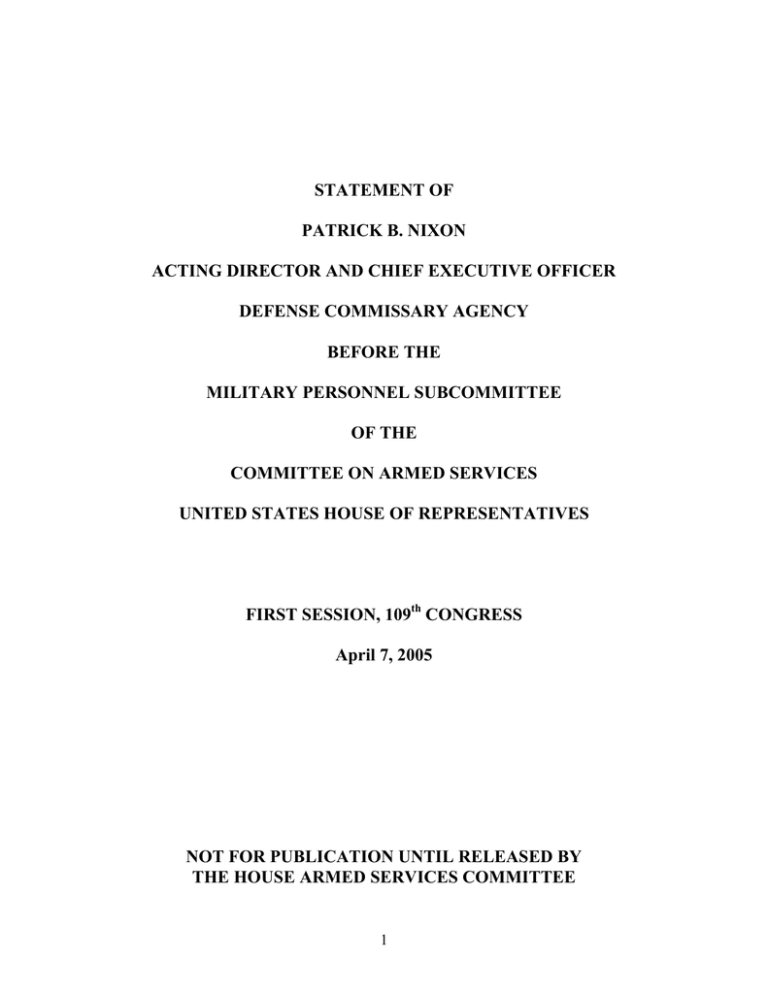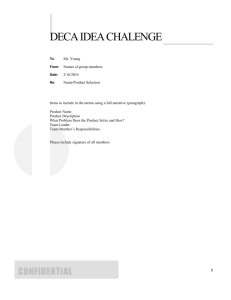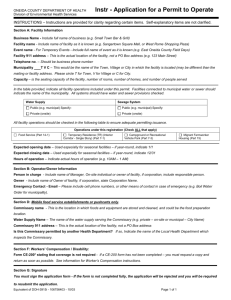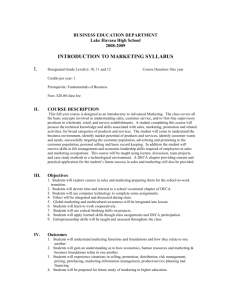STATEMENT OF PATRICK B. NIXON ACTING DIRECTOR AND CHIEF EXECUTIVE OFFICER
advertisement

STATEMENT OF PATRICK B. NIXON ACTING DIRECTOR AND CHIEF EXECUTIVE OFFICER DEFENSE COMMISSARY AGENCY BEFORE THE MILITARY PERSONNEL SUBCOMMITTEE OF THE COMMITTEE ON ARMED SERVICES UNITED STATES HOUSE OF REPRESENTATIVES FIRST SESSION, 109th CONGRESS April 7, 2005 NOT FOR PUBLICATION UNTIL RELEASED BY THE HOUSE ARMED SERVICES COMMITTEE 1 Mr. Chairman and Members of the subcommittee, it is my pleasure to appear before you to provide the Defense Commissary Agency’s (DeCA) update for this past year. When forces deploy, the families left behind depend upon their local community services, including the commissaries, to see them through tough, nervous, lonely times. We, at DeCA, are proud of the contribution we make in operating more than 270 commissaries worldwide providing tremendous savings on groceries for military personnel, retirees and their families that they may frequent knowing they are in a safe and secure shopping environment. Commissaries enable military families to deliver a highly valued component of military compensation in areas where the cost of living is high, and they bring a morale-building “taste of home” feeling by providing familiar American food products in overseas locations where such products are often unavailable. Shoppers save an average of more than 30 percent on their purchases compared to commercial prices – savings worth more than $2,700 annually for a family of four. A core military family support element, and a valued element of military pay and benefits, commissaries contribute to total family readiness, enhance the quality of life for America’s military and their families, and help recruit and retain the best and brightest men and women to serve our country. Fiscal year 2004 was an impressive year for DeCA; and 2005 shows all the signs of being even better. In the final analysis three key metrics — sales, savings, and service — really said it all: SALES: Our sales exceeded $5.2 billion, an increase of 3.9 percent, or $197 million, over last year. Sales in the first quarter of fiscal year 2005 were $50 million higher than forecasted for that quarter. This is remarkable when, by contrast, you consider commercial sector supermarkets failed to demonstrate sales growth. In fact, between 1998 and 2003 the supermarket sales share for groceries and consumable items has slipped by 37 percent and 2 industry analysts project an additional 13 percent decline in supermarket sales by 2008 through sales lost to other food retailers. Sales increases have the dual effect of not only increasing customer savings but also expanding surcharge revenue enabling us to continually reinvest in our facilities and provide the modern shopping facilities our customers expect. SAVINGS: Customer savings form the core of the commissary benefit. Both the level of savings that we provide to the military community and the fact that we deliver these savings to remote locations and overseas environments make the commissary benefit one of the highest valued benefits provided our military personnel. We may improve our stores, use the latest retail technology, and provide the finest customer service, if we do not deliver significant savings, there is no commissary benefit. Ultimately, success is measured by the annual price comparison. During this process, patron savings are calculated by comparing DeCA prices to commercial supermarket and supercenter competition throughout the world. Comparing over 30,000 identical meat, produce, and grocery items to compute the overall average savings figure, patron savings for commissary sales is 32.1 percent. SERVICE: Customers gave commissaries all-time high grades in the Defense Commissary Agency’s latest customer satisfaction survey, which means it’s a good time for even more eligible patrons to experience the service and savings of commissary shopping for themselves. The survey conducted at all commissaries worldwide during September and October collected responses from more than 21,000 customers. Customers gave the highest overall marks ever – 4.55 out of a possible maximum score of 5 – and marks improved in all 14 areas we measure. Our improved customer satisfaction was also validated by an independent measure of patrons’ satisfaction with a 2004 score of 76 from the American Customer Satisfaction Index (ACSI). The score of 76 was three points higher than the national average 3 score for commercial supermarkets. I’m especially pleased when our customers notice and appreciate the high level of service our employees provide. Their dedication and hard work make commissary shopping a pleasurable experience, which is what the men and women in our nation’s military services deserve. I am also happy to report that the number of young active duty shoppers increased. And, our National Guard and Reserve members are using their fulltime commissary benefit granted by the Congress. Today, we compete in an extremely complex supermarket industry, one whose business landscape has dramatically changed within the past 10 years. The rapid introduction of supercenters by non-traditional operators fueled one of the most aggressive food store acquisition periods in history as major supermarket chains have sought to expand their market share and improve their buying leverage to offset mass merchandiser share growth. Maintaining this leading edge, while coping with every day problems, takes a great deal of work, and the dedicated men and women at DeCA who proudly administer the commissary benefit, remain vigilant and are poised to take advantage of opportunities as they arise — both to improve the benefits for our customers and to improve ourselves. We continue to partner with industry to focus our promotional efforts and capitalize on the latest industry trends and react quickly to changes in consumer purchasing patterns. We’ve streamlined our business processes and corporate structure to focus on store operations, control of corporate costs, and prepare for future changes. We have accomplished much this past year. To maximize the value of the benefit, DeCA must operate like the most modern supermarket chains within the country. Senior leaders at DeCA have visited with the senior management at a number of our top trading partners. In addition to discussing the current performance of their products in DeCA outlets, we have discussed the most probable future of 4 the grocery industry, their plans for the future and ours. These top-to-top discussions have been very productive and are enabling DeCA to benchmark against the best practices industry is using today and planning for the future. In early 2004, we developed a prototype store concept designing a store workforce that was simple, easy to manage, cost effective, more productive and maximized the changes anticipated by implementation of the National Security Personnel System. The final workforce model eliminated 12 different position descriptions and created a multi-skilled Store Associate. To ensure that employees can be assigned various duties to meet mission requirements, a 2-year training plan was developed to teach employees how to perform all store functions. The anticipated advantages of this store model are: simplified hiring, greater productivity, flexible scheduling, increased customer service, and lower costs. From the employee perspective, the training plan teaches them the fundamentals of the grocery business, allows them to determine the area in the store where they have the greatest interest and skill, and prepares them to move upward into management. On January 23, 2005, Smokey Point, Washington, became our first prototype store. If the test at Smokey Point proceeds satisfactorily against our established baselines, we plan to implement our second prototype at Grand Forks Air Force Base, North Dakota, this summer. We continue to focus on our customers and provide greater conveniences and a more gratifying shopping experience for them. We now have world-class perishables, produce and meat that encircle the perimeter of our stores. We continue to focus on areas that will better serve our customers, such as health and wellness, organic and natural, semi-annual case lot sale events, targeted promotions and refined category management practices that will provide the lowest product prices for our customers. All of this is captured in our “store of the future” concept. The 5 “store of the future” will capitalize on the latest industry trends to react to changing consumer purchasing patterns. An initial rollout of this exciting format is planned at the new 32nd Street store at Naval Station San Diego in 2007. It’s going to have a store within a store focused on health and wellness and it’s going to feature the strength of our perishable departments, particularly meat and produce. It will also feature expanded use of self-checkout and technology enhancements such as electronic shelf-labels. We’re also taking on a leadership role in the Department’s communications network to get the word out to the military community on a number of issues that affect them personally from voting, to health, to taking care of their families. Commissaries worldwide participated in a unique partnership with the Federal Voting Assistance Program and the Department of Defense to encourage all members of the uniformed services, retirees and their families to register and vote. Since commissaries are among the most visited locations on any installation, we made a significant contribution toward increasing awareness among military families of the importance of registering to vote. All over the world, commissary employees supported installation voting assistance officers so Service Members and their families could receive registration assistance to ensure they could exercise their right to vote. DeCA has partnered with TRICARE on their "Healthy Choices for Life" initiatives. Through this partnership, DeCA will participate in a collaborative effort with the DoD nutrition committee to inform military families about eating healthier, controlling their weight and promoting concepts such as weight management and fitness, as well as "financial fitness" through commissary savings. Local nutrition experts at installations will be encouraged to 6 conduct commissary tours as a way to inform military members of healthy eating options, as well as introduce authorized shoppers to the full value of the commissary benefit. This year, DeCA began working closely with the Service’s New Spouse Programs to ensure that new spouses joining the military family are familiarized with the commissary benefit. This also familiarizes spouses with potential employment opportunities. DeCA is one of the largest employers of military spouses. Spouses of active duty military members make up over 38 percent of DeCA’s workforce. We were also pleased to be able to assist the Department in informing our patrons about the Military OneSource program. Military OneSource is the newest member of the DoD military family support team. It’s website provides a wealth of information and advice to military families on topics ranging from family support issues, debt management, and legal assistance contacts to how to obtain a plumber. Because of our visibility in the military community, commissaries are happy to assist in placing the OneSource message in front of millions of commissary customers. These reminders will come in the form of posters in stores, pins on cashiers, and even printing OneSource messages on our grocery bags. We share DoD’s interest in making sure we do whatever we can to get the word out to military shoppers with a need for these services. We’re providing responsible stewardship of taxpayers’ dollars, and are administering this cherished benefit as efficiently and effectively as possible to ensure that we maximize the value of the benefit for authorized patrons in a manner that is cost efficient to the taxpayer. For the third consecutive year the Agency’s financial records have met and exceeded the requirements of the President’s Management Agenda. DeCA once again received an unqualified audit opinion for its 2004 financial statements from the independent accounting firm KPMG. 7 We were one of only six agencies within the Department of Defense to achieve this certification of its financial records. The “unqualified opinion” signifies that auditors had no reservations regarding the accuracy and fairness of DeCA’s financial presentation or the application of generally accepted accounting principles to DeCA’s operations. DeCA also tied with two other Department of Defense components in earning second place on its annual Statement of Assurance Scorecard for fiscal 2004. Of these, DeCA was the most improved, earning congratulatory remarks from the Department’s Comptroller office. The scorecard grade for the 2004 Statement of Assurance, established by the Federal Managers’ Financial Integrity Act of 1982, requires DoD components to establish effective management controls and continually assess them. The Statement of Assurance Scorecard graded five categories: reporting timeliness, accuracy and completeness of the report, extent of componentwide program execution, training conducted, and weakness reporting, which measures both the extent of fully disclosing material weaknesses and promptly resolving previously reported weaknesses. We’re also providing a means for others who wish to visibly demonstrate their support of our military. Our employees, both corporately and individually, are doing the same. The Gift of Groceries continues to be a very successful program. Since the program began in the fall of 2002, over $5 million in commissary gift certificates have been provided to military families. During the holidays in particular, gift certificates have proven to be handy for food basket programs by allowing recipients to purchase the groceries they need and prefer, rather than getting food items they might not be able to use. The public can also donate gift certificates to worldwide organizations that assist military families such as the USO, Air Force 8 Aid Society, and the Fisher House Foundation. Since the “Gift of Groceries” program began, nearly $130,000 has been donated to qualifying charities. In addition to taking care of families, our European Region continues support Special Forces units in Afghanistan and military activities in Kuwait and Bahrain. They also filled numerous other special requests ranging from providing goods for special occasions such as a Nurses Party at the Baghdad Hospital, to supplying dog food for the K9 units in Kandahar. Recently DeCA Europe started processing meat products at our central meat processing plant for shipment downrange. Another area of support is from our employees and suppliers, in the United States and overseas, who have donated their time, money, and goods to provide comfort items for those hospitalized, to welcome home those returning from deployments and to provide families of deployed troops with holiday gift checks, shopping sprees and the like. DeCA was also on scene to support military units engaged in humanitarian operations following the Indian Ocean tsunami. Using supplies on hand in our Pacific central distribution centers we were able to quickly provide water, food and other subsistence items to the military forces deployed in the relief effort. We’re committed to delivering the commissary benefit to our entire patron base even though it is inevitable that we will continue to face challenges shaped by our national interests, created by natural disasters, or imposed by economic impacts like foreign currency fluctuation. Yet, for those of us who support the military resale sector perhaps our biggest challenge is the changing face of the military family. No longer are we looking at a predominately single-service member force. As Sydney J. Freedburg Jr. recently observed, in writing for the National Journal, “America is fighting its biggest war in decades with the most-married military in its 9 modern history. In contrast to past conflicts waged by young, single draftees, just more than half of today's forces (active and reserve) are married, and more than 40 percent have children.” The challenge has been enhanced by the nation’s reliance on the reserve component to a greater extent than at any time since World War II. DeCA reaches out every day to these individuals to ensure they are aware of the benefit the commissary provides them and their families. We know we have had successes in delivering the commissary benefit message. Our internal survey shows the number of first time shoppers in the Active Duty And Reserve Component has increased by 53 percent. In part our message has been delivered by our managers at basic training sites like Fort Knox, Great Lakes Naval Station, and Lackland Air Force Base, who stepped up their efforts to ensure new recruits are briefed on the commissary benefit. Others have partnered with installation Single Service member programs, which introduce single service members to their commissary benefit. And, industry has helped too. In 2004, the Commissary Awareness Team, comprised of industry members, developed coupon books aimed at supporting the Guard and Reserve outreach efforts as well as other groups. Over 100,000 coupon books were printed and distributed at newcomer’s briefings, deployment briefings and other outreach events. The redemption rate of 30 percent for these coupons demonstrated they successfully delivered the commissary message to the target groups. We are also going to test taking the commissary to the patron. We are doing this by partnering with manufacturers and distributors to offer truckload sales of authorized commissary products at Guard and Reserve Centers. In addition, because so many Guard and Reserve families don’t live in proximity to a commissary, we are exploring the possibility of providing them limited access to the commissary over the Internet. We are identifying our industry 10 partners who are interested in having patrons place an order through the DeCA website for shipment of products directly to their home from a participating manufacturer. DeCA’s strategic plan lays out the agency’s road map for the upcoming years and continues the transformation of the agency. These are not cost cutting drills, but rather actions to improve DeCA’s performance and processes. We base our decisions on strong business cases and use metrics to accurately measure our performance in achieving our mission to provide the commissary benefit. Even though substantial savings have already been realized, we continue to strive for higher levels of service at lower cost. DeCA pledges a commitment to the taxpayers in the stewardship of their funds and acknowledges awareness of its responsibility to spend commissary dollars wisely and economically. We continue our drive to re-engineer the agency by reviewing the organizational structure as well as improving our business processes. A driving factor behind this reengineering initiative is the need to position the agency and its work force to meet future challenges, like military installation restructuring, A-76 competitive sourcing initiatives, and the Integrated Global Basing Initiative. We must also continue to ensure that activities above store level are efficient and effective and provide stores with excellent service. Functional process owners have been exploring ideas on how to best structure their respective functions to provide commissaries with effective and efficient support while eliminating redundancies and improving standardization. Managers are considering an array of alternatives such as consolidating certain support functions, or having certain activities accomplished by other agencies or business enterprises. As we explores the alternatives, look for functional process owners to work more closely with their region counterparts to ensure the agency captures a corporate view — one that focuses on delivering services and products to stores. 11 A second part of re-engineering entails streamlining business processes. While efforts to restructure the organization focus on where and what functions are being done, the streamlining of business processes looks at how we do business and what improvements can be made. To assist in this, DeCA plans to use Lean Six Sigma as a re-engineering tool. Lean Six Sigma is a modern management methodology that will help us refine our business processes so that we can better deliver products and service to stores and customers. Lean Six Sigma looks at how a process is accomplished and removes waste, increases speed and instills consistency. Our first use of this tool will be to reengineer the complaints and hiring processes. This course of business is necessary to strengthen commissary benefit, which in turn, fosters a sense of community and is a core military family support element in quality of life enhancements. DeCA pledges to continue its transformation to preserve and strengthen the commissary benefit through programs that enrich the lives of our patrons. I have been pleased to have the opportunity to tell you about the great things DeCA has accomplished this past year and of its contributions to the quality of life of our military families. As we face the challenges of the present and the future—base closure and realignment, changing marketplace, organizational realignment, and other executive branch initiatives, including implementation of the National Security Personnel System—I am confident and optimistic DeCA is postured to continue to deliver the premier quality of life benefit to the armed services community. I will be happy to answer any questions you may have. 12






